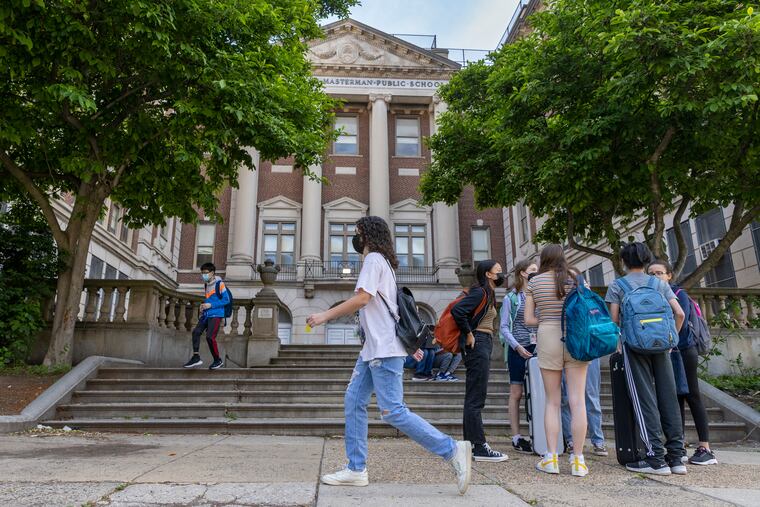Eliminate standardized test requirements for some Philly special-admissions schools, consultant recommends
The evaluation also included a recommendation that eligible eighth graders attending special-admission middle-high schools be granted automatic admission to ninth grade.

The Philadelphia school district should consider eliminating standardized test requirements at some of its special-admissions schools and allow schools more flexibility in determining which students to accept, a new evaluation says.
The evaluation, presented by district-hired consultants during a school board meeting Thursday, also included a recommendation that eligible eighth graders attending special-admission middle-high schools be granted automatic admission to ninth grade.
And, the consultants said, the district needs to better communicate the school admissions process — which was revamped in 2021 with the goal of increasing equity, prioritizing students from certain underrepresented zip codes at a handful of selective schools.
But the changes — which came with strict admissions criteria — met with widespread dissatisfaction, resulting in unpredictable lottery outcomes and open seats at a number of schools.
Just one in five people surveyed were happy with the admissions process, according to the consultants with Accenture, which the district hired after it began reviewing its process in August 2022. The firm sought feedback from students, parents, counselors and principals, and also evaluated how Philadelphia’s admissions process compared to that of other major urban school districts.
Many other districts “have already optimized their systems and curated it based on their needs,” said Nicole Newman, one of the Accenture consultants. She recommended that Philadelphia ensure that staff and families are trained on the process so that applying “doesn’t feel like a black box.”
Superintendent Tony Watlington did not comment on specific recommendations at the meeting, but said the district would study the findings and announce changes by July 30 for the 2023-24 school year.
The district overhauled its admissions process in 2021, moving from a system where principals had some latitude in admissions to a computerized lottery system that included priorities for students from certain zip codes.
Officials were attempting to solve for a mismatch between the city’s demographics and the composition of student bodies at some magnet schools, like Central and Masterman.
But the fixes often did not have the desired effect. A 2022 report found that while more students of color met admissions requirements for magnet schools, the percentage of Black and Latinx students who gained entry into the most elite schools remained quite low, under 10% for both groups at Central and Masterman.
For the 2023-24 admissions cycle, more problems were underscored. Hundreds of students walked out of their schools to protest the changes that resulted in hundreds of empty seats in some of the 39 criteria-based schools after not enough students met admissions criteria.
Prior to the changes, principals had the ability to admit students who came close to meeting admissions standards, allowing them to offer opportunities to students whose circumstances might go undetected otherwise — a student who had a high number of absences, for instance, because of responsibilities caring for siblings, or someone with a C because their family had been experiencing homelessness.
The shift to strict enforcement of admissions criteria “was a key driver in reducing access to more criteria-based schools,” said Nahomie Louis, another consultant. She said that academic studies also showed that weighing different eligibility criteria rather than imposing cutoffs “has been a better predictor” of academic success.
She and Newman noted that many didn’t support using Pennsylvania System of Standardized Assessment (PSSA) scores to determine high school admissions — with 45% of principals “strongly dissatisfied or dissatisfied” with using the PSSAs as criteria.
The district could begin working with schools to evaluate admissions criteria, as well as begin a process “to determine which schools should transition from criteria-based to citywide,” Newman said.
The consultants recommended granting eligible eighth grade students attending special-admission middle-high schools automatic entry to ninth grade — citing research in favor of “instructional program coherence,” as well as frustration from high-performing eighth graders about reentering the lottery system.
Of 168 Masterman eighth graders eligible to attend the school’s high school, only 33 received offers in the random lottery, Louis said. She noted that granting automatic entry “means that certain class sizes at the middle school level will have to be reduced to ensure there’s continuity.”
Other recommendations included adding resources to support counselors and appeals teams related to students with disabilities applying to special-admissions schools, as well as optimizing the lottery system to ensure eligible students receive at least one offer; this year, 20% of eligible applicants received none, according to the consultants.